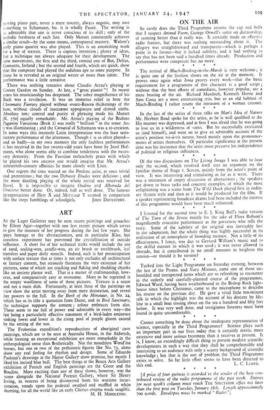ON THE AIR
So rarely does the Third Programme assume the cap and bells that I suspect Animal Farm, George Orwell's satire on dictatorship, of seeming better than it really was. It certainly made an effective radio feature, but there was nothing outstanding about it. The allegory was straightforward and transparent—which is perhaps a point in its favour—but it lacked subtlety, and it had nothing to say that has not been said a hundred times already. Production and performance were competent but no more.
The revival of Much-Binding-in-the-Marsh is very welcome ; it is quite one of the liveliest shows on the air at the moment. It proves once again what lima proves every week—that the basic requirement for a programme of this character is a good script ; without that the best efforts of comedians, however popular, are a mere beating of the air. Richard Murdoch, Kenneth Horne and Sam Costa are a most entertaining trio, but as an old habitué of Much-Binding I rather resent the intrusion of a woman crooner. * *
In the last of the series of three stalks on Man's Idea of Nature Mr. Herbert Read spoke for the artist, as he is well qualified to do. His manner was depressed, and at first I was afraid that he was going to lose us in a wilderness of -isms. But he successfully extricated us (and himself), and went on to give an admirable account of the artist's position vis-a-vis nature, based mainly upon the pronounce- ments of artists themselves. Of particular significance at the present time was his insistence that the.artist must preserve his independence
of political or religious influences.
* * * *
Of the two discussions on The Living Image I was able to hear only the second, which resolved itself into an argument on the familiar theme of Stage v. Screen, mainly from the actor's point of view. It was interesting and stimulating as far as it went. There was a minimum of empty discussion of abstractions ; the speakers got down to brass tacks and concrete examples, of which the most enlightening was a scene from The Wild Duck played first in ordin- ary theatre style and then as it would be produced for the film. If a speaker representing broadcast drama had been included the interest of this programme would have been much enhanced.
* * * *
I listened for the second time to E. J. King Bull's radio version of The Turn of the Screw mainly foi the sake of Flora Robson's magnificently evocative performance as the governess who tells the story. Some of the subtlety of the original was inevitably lost in the adaptation, but the whole thing was highly successful in its realisation of an atmosphere of brooding menace. Not a little of its effectiveness, I fancy, was due to Gerrard William's music and to the skilful manner in which it was used ; it was never allowed to obtrude, but it contributed in no small measure to heighten the tension—or should it be torsion? * * Tucked into the Light Programme on Saturday evening, between the last of the Proms. and Navy Mixture, came one of those un- heralded and unexpected items which are so refreshing to encounter in the orderly and carefully-planned course of the programmes. Edward Ward, having been weatherbound in the Bishop Rock light- house since before Christmas, came to the microphone to describe his rescue on the previous day. He gave a vivid little ten-minute talk in which the highlight was the account of his descent by life- line to a small boat tossing about on the sea a hundred and fifty feet below. It was very well done, and vertiginous listeners must have found in quite uncomfortable. * * Cannot something be done about the inadequate representation of science, especially in the Third Programme? Science plays such an important part in our lives today that it certainly merits more extensive and more serious treatment than it receives at present. It is, I know, an exceedingly difficult thing to present modern scientific developments in such a way that they shall be comprehensible and interesting to an audience with only a scanty background of scientific knowledge ' • but that is the sort of problem the Third P;ogramme exists to solve. So far little effort seems to have been directed to this end. L. C. LLOYD. * * [A prize of four guineas is awarded to the sender of the best con- tributed review of the radio programme of the past week. Entries for next week's column must reach THE SPECTATOR office not later than the first post on Tuesday, 7anuary 28th. Length approximately 70o words. Envelopes must be marked " Radio."1


































 Previous page
Previous page